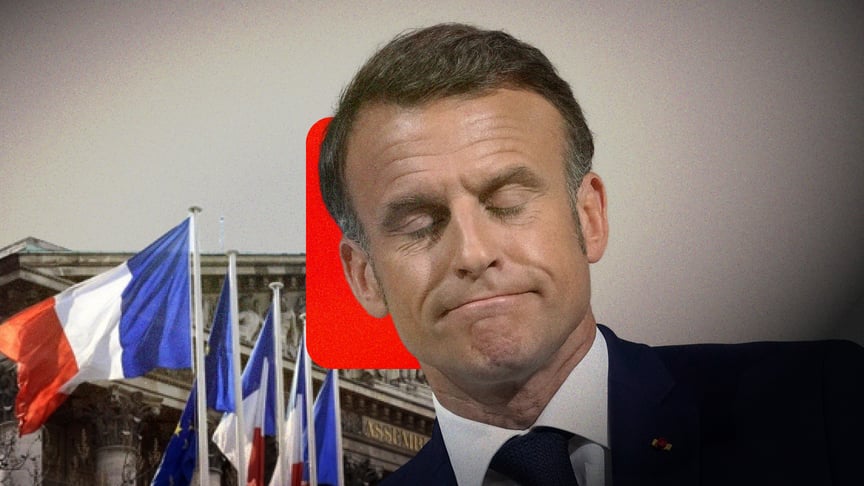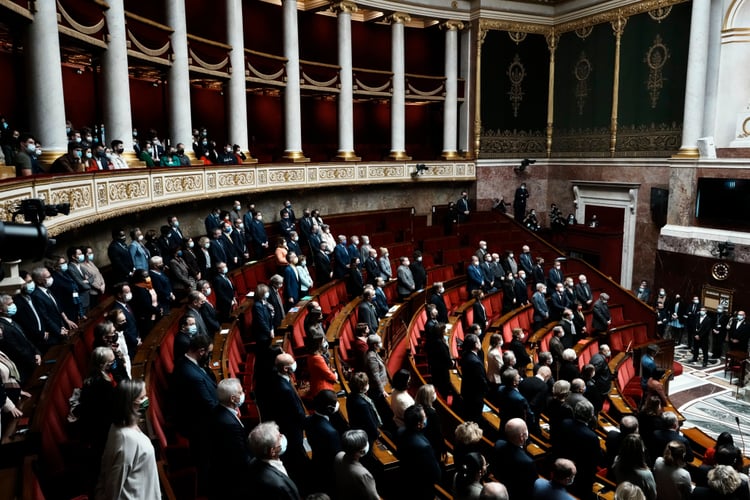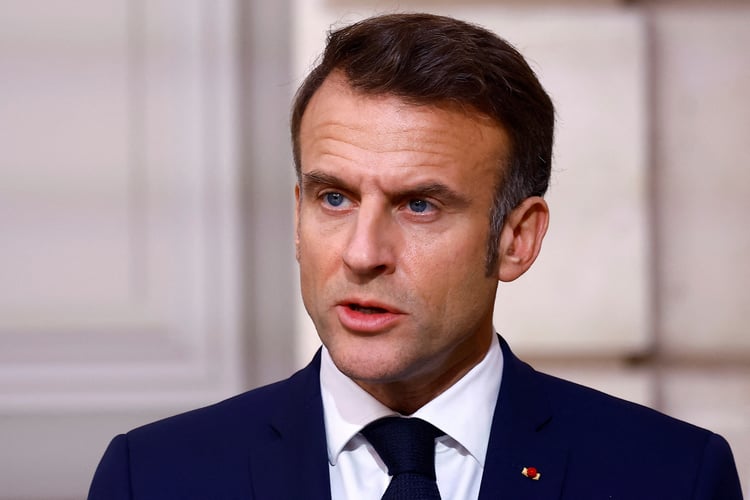Macron vs. Parliament: How the political crisis in France will impact aid to Ukraine.

France Held Hostage by Populists
Political turbulence in France began long before the vote of no confidence against the government. Economic issues and unpopular decisions by the authorities intensified pressure on Emmanuel Macron with each passing year of his presidency.
This summer, the president's political party lost its majority in parliament. In the snap elections for the National Assembly, the lower house of the French parliament, the ultra-left party block "New Popular Front," led by Jean-Luc Mélenchon, emerged victorious. Emmanuel Macron's alliance "Together" came in second, while the far-right "National Rally," led by Marine Le Pen and Jordan Bardella, took third place.
However, none of the political forces garnered enough votes to form a parliamentary majority. The election winners insisted that the president appoint their representative as prime minister. Nonetheless, Emmanuel Macron did not meet the demands of the ultra-left and appointed Michel Barnier, a representative of the center-right party "Republicans," which finished in fourth place in the parliamentary elections, as head of government.
Macron's stubbornness only fueled the political confrontation, effectively sending the "New Popular Front" into opposition. A situation arose where the new government lacked a parliamentary majority, making the premature resignation of Prime Minister Barnier merely a matter of time. In the end, he held the position for only three months.
The French parliament supported a vote of no confidence against the government for the first time since 1962. Even more unusual for France was the unification of political forces that achieved the resignation of the country's prime minister. In the previous parliamentary elections, the ultra-left block "New Popular Front" coordinated its efforts with the presidential block of Emmanuel Macron's parties to prevent the far-right "National Rally" from gaining power.
However, this time both the ultra-left and far-right united against the president and the government. In the context of Ukraine, such a situational alliance would seem as strange as a coalition of communists with the "Right Sector."

New Government, Same Problems
From the very first day of his premiership, Michel Barnier made it clear that his priority would be to reduce the French budget deficit. The new Prime Minister François Bayrou will likely continue the policies of the previous government. Thus, Barnier's action plan may represent not the past but the future of French political life.
In 2024, the budget deficit reached 6.1% of GDP, prompting the European Commission to initiate an "excessive deficit procedure" — a more stringent oversight of France's budget formation. The budget deficit for EU member states should not exceed 3% of GDP to maintain the financial stability of the eurozone and the euro's exchange rate.
The budget proposed by Barnier's government included a reduction in expenditures by 40 billion euros, including on social welfare programs. There were also plans to significantly raise taxes, which would ensure budget revenues of 20 billion euros by 2025. These unpopular measures could help the government reduce the budget deficit to 5% of GDP and alleviate the debt burden.
France pays about 60 billion euros annually to foreign creditors to cover interest on loans. This is 10 billion euros more than the entire defense budget for the country in 2024, which amounts to 50 billion euros. This year, the size of France's public debt to foreign creditors has already reached 110% of GDP. Instead of supporting the government during this critical moment and voting for the 2025 budget, the opposition opted to demand the prime minister's resignation for proposing unpopular solutions.
“The next government will face the same problems that need to be resolved. The resignation of the government will not solve the issues facing the country,” stated Michel Barnier following his resignation.
The change of government only drives the country into a deadlock, as snap parliamentary elections cannot be scheduled earlier than 12 months after the previous ones. In other words, party ratings currently hold no decisive importance, as elections cannot occur until at least next summer, and the state budget for 2025 will still need to be adopted. If parliament does not vote for next year's budget by the end of this year, the 2024 budget will be automatically extended until a new budget is adopted, explained Leonid Litra, a senior analyst at the Center for "New Europe," in a conversation with hromadske.
With such political circumstances in France, it is hard to imagine that the next government will work stably and satisfy everyone. However, there are also risks for the opposition forces. If they continue political games and attacks on President Macron, threatening to send another government into resignation, the public will see that the opposition is not eager to solve problems but only exacerbates the situation in the country with its actions.Leonid Litra, senior analyst at the Center for "New Europe"
By the end of this year, a new government is likely to be formed, and the budget for 2025 will be adopted, but it is unlikely that spending cuts, including aid to Ukraine, can be avoided, noted Leonid Litra in a comment to hromadske.
“France Gives Ukraine More Than Just Weapons and Money”
Ukraine should prepare for the possibility that Paris will be unable to fulfill its promise of providing Kyiv with 3 billion euros in military aid in 2025. This was stated by Defense Minister Sébastien Lecornu back in October this year.
“At the beginning of 2024, it was decided that France's annual assistance to Ukraine should be at the level of 3 billion euros. In reality, we will probably be able to provide Ukraine with around 2 billion euros next year,” said Sébastien Lecornu on October 14.
Cooperation in the defense sector is beneficial for both countries. The French defense industry receives orders for the production of ammunition, artillery systems “Caesar,” etc. Halting such cooperation due to funding shortages would be not only anti-Ukrainian but also anti-French. The opposition cannot be against French companies supplying weapons to Ukraine and making profits. Therefore, while there are risks of reduced military aid funding, there is currently no threat of stopping support for Ukraine from France, despite the political crisis and economic problems.Leonid Litra, senior analyst at the Center for "New Europe"
Moreover, the change of government will not affect the level of political support that France provides to Ukraine, as it is the president, not the government or parliament, who deals with defense and foreign policy issues and is responsible for appointing the defense and foreign ministers in the government.

President Macron maintains a consistent pro-Ukrainian stance. Ukraine should be grateful to the French leader for providing SCALP cruise missiles and other weapons, as well as for strong diplomatic support on the international stage. France was the first country in the world to announce the removal of any restrictions on striking military targets on Russian territory with its missiles. Macron was the first European leader to propose sending NATO member state troops to Ukraine to protect Ukrainian sovereignty.
It is also worth noting that President Macron actively helps President Zelensky establish contacts with the newly elected President of the United States, Donald Trump. Macron was the one who persuaded Trump to meet with Zelensky in France on December 7, despite the American president not planning this meeting, noted Leonid Litra in a conversation with hromadske.
France's assistance should not always be measured in monetary terms. This country is an important strategic partner for Ukraine and provides significant political and diplomatic support to Kyiv. President Macron's leadership in supporting Ukraine is invaluable. The financial aspect is not the decisive factor here.Leonid Litra, senior analyst at the Center for "New Europe"
Emmanuel Macron's presidential term expires in 2027. Despite the ultra-left block "New Popular Front" calling for the president's resignation and threatening him with impeachment, it is almost impossible to force the president of France to leave office prematurely.
To initiate the impeachment process, it must be voted on by at least two-thirds of the deputies in both houses of parliament. Even if the ultra-left and far-right political forces join forces, they still will not have enough votes to declare impeachment against the president. Therefore, Ukraine can expect that France's support will remain steadfast in the coming years, despite economic problems and political instability.